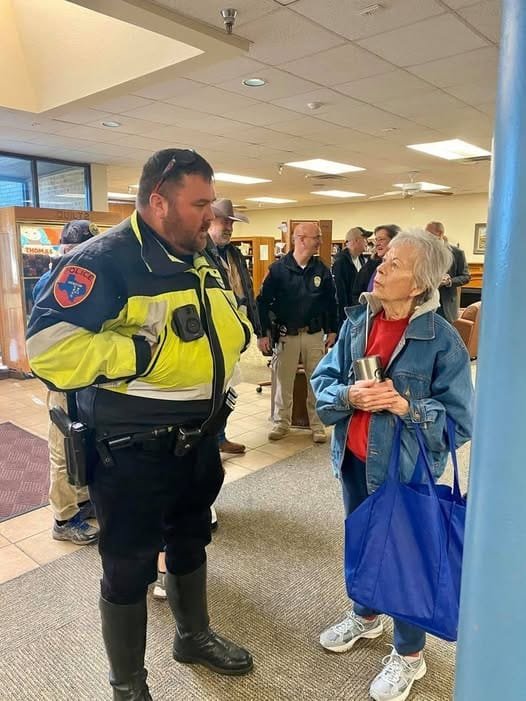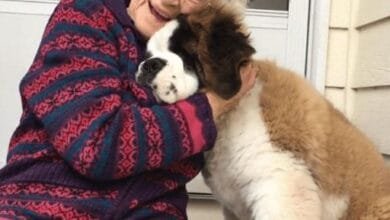I Stayed Because She Kept Saying, “He’s Coming Back.”

I was just picking up a new lamp after my shift, at this little family-owned furniture store off Elm. I hadn’t even been inside five minutes when I saw her — a tiny woman, maybe in her seventies, gripping the side of a loveseat like it was the only thing holding her up. Her eyes were darting around, searching for someone.
I walked over and asked if she was okay. She answered softly, “He’s coming back. I just needed a minute.”
I figured she might be waiting for a relative, so I offered to sit with her. Then I noticed her hands were trembling, and there was a deep red mark on her wrist — like someone had grabbed her too hard. When I asked about it, she flinched and said, “I shouldn’t have said anything.”

That’s when my instincts kicked in. I showed her my badge, told her she was safe, and offered to call someone. She looked up at me with tired eyes and whispered, “Please don’t let him find me before I leave.”
She wouldn’t say who “he” was, but her purse was stuffed with papers — medical forms, a checkbook, and a bus schedule. No phone. No ID. The store clerk didn’t know her name, only that she came in often to sit and “rest.”
I offered to drive her to the station or somewhere safe, but she hesitated. Said she had “one more thing” to do before leaving town. Then she handed me a crumpled note she’d been holding the whole time.
I didn’t even get the chance to read it before I heard the front door jingle. And the look on her face?
Let’s just say I knew — I wasn’t going anywhere.
He entered the store slowly and deliberately, like he owned the place. Tall, broad-shouldered, probably late 40s. A baseball cap pulled low, his eyes locked right onto her. She shrank back, squeezing my wrist so tight it stung. I didn’t know his name or the full story, but I knew he was dangerous.
The clerk, an older man behind the counter, nervously cleared his throat. “Can I help you with something?” he asked. The man just nodded toward us and muttered, “Nah, I’m good,” then started circling some chairs near the entrance.
I turned to the woman and quietly said we should move to a safer spot. She didn’t speak, just nodded, her eyes full of tears. I led her toward the back of the store, near a small office. The clerk followed our lead, locked the front door, and flipped the sign to CLOSED. The man glared, but didn’t push his way in — just hovered near the displays, watching like he was waiting for someone to slip up.
“Ma’am,” I whispered, “please tell me your name. I promise you’re safe.”
She swallowed hard and said, “My name is Evelyn.” Then she took a shaky breath. “That man… he’s my nephew. He’s supposed to be my caretaker, but—” She paused. “Ever since my husband passed, he’s done nothing but take from me.”
There was shame in her voice, like she blamed herself. She pressed the crumpled note into my hand again. Now that we were more hidden, I opened it. It was a letter addressed to someone named Bethany. The handwriting was shaky but clear:
Bethany, I’m sorry. I know it’s been years, but I had no choice. I need to see you before I go. He thinks I’m worthless now, and I’m too afraid to stay. Please… let me explain everything.
“Bethany?” I asked gently. “Is she your daughter?”
She nodded, tears welling in her eyes. “We’ve been estranged for years. My nephew kept telling me I was too sick to travel, that Bethany didn’t want to see me… but I never believed it. I have to find her before I get on that bus. I just don’t know how.”
I saw the bus schedule sticking out of her purse — a late-night route, leaving in just a couple of hours. There was urgency in her voice and fear in her eyes. She was clinging to the hope of seeing her daughter one last time.
“Okay,” I said. “First things first — let’s get you somewhere safe. Then we’ll figure out how to reach Bethany.” She looked like she wanted to argue, but I added gently, “The station’s just six blocks away. Once we’re there, I’ll help you find her.”
She nodded slowly, trembling. I led her toward the side exit. The clerk watched from a distance, ready to help. As we moved through a dim hallway, we heard the man’s voice echo:
“Evelyn! I know you’re in here. You can’t hide!”
She flinched, and I could feel the fear rolling off her. With the clerk’s help, we made it out the back door. As we stepped into the alley, I could still hear him knocking over furniture. I guided Evelyn to my car, parked a few steps away, and drove off quickly but carefully.
On the drive to the station, Evelyn told me everything. Her nephew, Wayne, showed up after her husband died. At first, he seemed helpful — offered to move in and take care of her. But soon he took control of her money, claimed she wasn’t mentally fit to live alone, and cut her off from Bethany. She believed his lies for years — until he drained her accounts and barely fed her. The bruise on her wrist wasn’t the first. She just never had the courage to speak up.
I parked behind the station and took her inside. It was a quiet night, so we found an interview room and got her a glass of water. I assured her she was safe now.
“Let’s find Bethany,” I said. With a few phone calls and a quick search, we found an old address on file — almost ten years old, but it was a lead. “There’s a patrol in that area,” I told her. “I’ll have them check it out, see if she’s still there.”
Evelyn’s eyes lit up. “Thank you,” she whispered. “I thought no one would believe me. He always said no one would help.”
I gently touched her shoulder. “You’re not alone anymore.”
As I stepped out to check my phone, I saw a missed call from the furniture store clerk. I called him back. He spoke quietly: “That guy tore outta here, burning rubber. He’s probably looking for you both. Be careful.”
I thanked him and alerted a few colleagues. We couldn’t arrest Wayne yet, but we could file a report and buy some time.
“Do you think we’ll find Bethany tonight?” Evelyn asked.
“I can’t promise,” I said, “but I’ll try everything I can.”
A few hours later, just as Evelyn considered canceling her bus ticket, I got a call from one of our patrol officers. They’d found a woman named Bethany still living at the old address. She’d inherited the house after her husband passed. The officer explained the situation — and Bethany was stunned. She hadn’t known her mother was trying to reach her. She thought her mom had cut her off, never suspecting someone had been intercepting her mail and calls.
When I told Evelyn, she broke down in tears. “It wasn’t her… it was him.”
I squeezed her hand. “We’ll bring her here. You can talk in a safe place.”
Bethany arrived a short while later, tears streaming down her face. The resemblance was immediate — same dark hair, same shy smile. She rushed into the room and hugged her mother like she’d never let go. I gave them privacy but caught snippets of their conversation.
“You never stopped trying,” Bethany said. “And I never stopped hoping.”
They cried together, sharing memories and filling in the blanks Wayne had created. He’d forged letters, lied about calls, and convinced them both the other didn’t care. It was heartbreaking — but it was also healing.
Eventually, they came out of the room hand in hand. “Thank you,” Bethany said. “Thank you for helping my mom.”
I nodded. “We’ll protect her. Can she stay with you while we sort out a protective order or find her a safe place?”
Bethany didn’t hesitate. “Whatever it takes.”
Evelyn looked at me with a quiet smile. “I don’t think I need that bus ticket anymore. I just needed a way out. Now I have one.”
We still had to deal with Wayne, but Evelyn wasn’t alone anymore. She had her daughter — and she had us. We filed the report and told them to call if Wayne showed up or contacted them in any way.
Before leaving, Evelyn hugged me. “You stayed,” she said. “You didn’t know me… but you stayed.”
I smiled. “You kept saying, ‘He’s coming back.’ So I stayed. And I’d do it again.”
They left the station together — a little shaken, maybe, but no longer isolated. As I watched them go, I thought about how easily cries for help can go unheard. Sometimes, all it takes is someone to stop and ask, “Are you okay?” — and truly mean it.
That night, I went home without the lamp I originally set out to buy. But I gained something much more meaningful. I witnessed the power of listening to your gut — and the power of staying.
If you take anything from this story, let it be this: You never know what someone is hiding behind their silence. When someone whispers “please help me,” or even just looks like they need it — be the one who stays.
Thank you for reading. If this story moved or inspired you, please like and share it. You never know whose life you might touch — just by being present.





